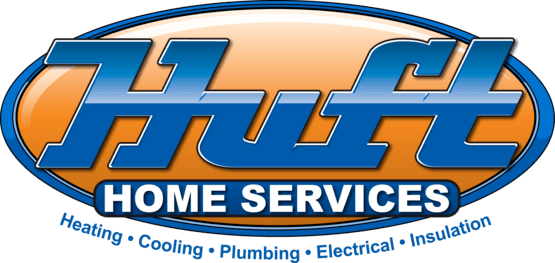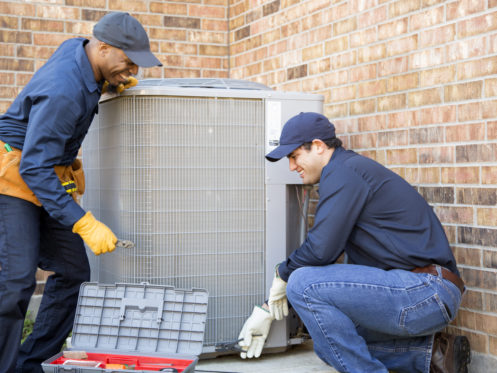A solid maintenance plan is essential for efficient operation, consistent indoor comfort, and a longer lifespan for your furnace and AC unit. Whether you are experienced with the workings of the HVAC system at your home, or you want to learn more about how it is maintained, our team at Huft Home Services can guide you through the process.
1. Clean or Replace Air Filters Regularly
Maintaining a well-functioning HVAC system begins with ensuring proper airflow. This largely hinges on the cleanliness and effectiveness of your air filters. They should be cleaned or replaced every one to three months, depending on the manufacturer’s guidelines and your indoor air quality. Doing so not only helps the system’s efficiency but also ensures the air circulating in your home is clean and healthy. Air filters clogged with dust, pet dander, or other particles can inhibit airflow and make your system work harder, reducing its efficiency and lifespan.
2. Check and Clean Vents and Registers
Another crucial element in the maintenance of your HVAC system is the routine inspection and cleaning of vents and registers. Over time, dust and debris can accumulate in these areas, leading to obstructed airflow and uneven heating or cooling throughout your home. By routinely checking and cleaning vents and registers, you can prevent these obstructions and maintain a consistent and comfortable indoor temperature. Doing this will also promote the longevity of your system.
3. Test Thermostat Accuracy
Thermostats control your home’s temperature and are crucial to the overall performance of your HVAC system. An improperly calibrated or malfunctioning thermostat can lead to inefficiencies and increased energy usage. Regularly verifying the thermostat’s accuracy ensures that it is maintaining your desired temperature settings. If the thermostat is inaccurate, you might need to calibrate it or consider upgrading it to a model that is more modern and energy-efficient.
4. Inspect and Clean the Outdoor Unit
The outdoor unit of your HVAC system is exposed to the elements and can become a hub for leaves, dirt, and other debris. This can block the airflow and potentially lead to system damage. Regular cleaning is essential, including the removal of any nearby foliage that might impede airflow. Maintaining a clean outdoor unit helps it run more efficiently and reduces the likelihood of premature breakdowns.
5. Have the Condensate Drain Line Cleared
The condensate drain line in your HVAC system removes the condensation produced during the cooling process. Over time, it can become clogged, potentially leading to water damage and reduced system efficiency. You can keep the drain line clear by cleaning it periodically with a mixture of bleach and water.
6. Have Moving Parts Lubricated
Like any mechanical system, your HVAC system’s performance is heavily dependent on its moving parts, like fan motors and bearings. Regular application of the appropriate lubricant, per the manufacturer’s guidelines, reduces friction and wear. This not only ensures smoother operation but can also significantly extend the lifespan of these components thus increasing the overall longevity of your HVAC system.
7. Have the Electrical Connections Checked
Electrical connections and wiring within your HVAC system can wear over time or become loose. This can lead to not just operational issues but also potential safety hazards. Inspection of these connections and their associated components ensures they’re in good working order, contributing to the safe and efficient operation of your HVAC system.
8. Test Your Carbon Monoxide Detectors
As part of your comprehensive HVAC maintenance plan, ensure that your carbon monoxide detectors are in good working order. These critical devices can help to alert you to potentially dangerous gases building up in your home. Test them regularly, and replace the batteries biannually. Additionally, it is important to replace the detectors themselves, as per the manufacturer’s recommendations, to ensure that they’re always in optimal condition.
9. Have Professional Maintenance Scheduled for Fall
Even with diligent, regular upkeep, you’ll need to schedule a professional HVAC maintenance visit from Huft Home Services at least once a year, preferably before the onset of winter. One of our trained technicians can provide a thorough inspection and tune-up of your system, catching any potential issues and ensuring peak performance during the colder months when the system is most needed.
10. Seal Air Leaks
As you focus on the HVAC system, don’t overlook the general energy efficiency of your home. Inspect your windows, doors, and ductwork for any potential air leaks. Sealing these gaps with weatherstripping, caulk, or insulation can prevent heat loss, maintain comfortable indoor temperatures, and improve the overall energy efficiency of your home.
11. Monitor Your System’s Performance
Stay observant of any unusual noises, odors, or changes in your heating system. These could be signs of underlying issues that need immediate attention. By promptly addressing these potential problems with the help of a qualified HVAC technician, you can avoid more expensive repairs down the line.
12. Keep the Surrounding Area Clean
The environment immediately surrounding your outdoor HVAC unit can significantly impact its performance. Keeping the area free from debris, leaves, and vegetation and maintaining at least 2 feet of clearance around the unit will promote better airflow and efficient operation. Regularly clearing the area can prevent long-term damage and improve your system’s overall lifespan.
13. Consider Programmable Thermostats
An upgrade to a programmable or smart thermostat can further improve your HVAC system’s efficiency. These devices can automatically adjust the temperature based on your daily schedule, saving energy when you’re away from home or asleep. This proactive temperature control can lead to significant savings on heating costs and promotes better energy usage.
14. Check Your Insulation
Adequate insulation is essential for the optimal functioning of your HVAC system. It helps to retain the heat generated by your system and prevents heat loss through the attic, basement, or crawl spaces. Regularly inspecting and enhancing your home’s insulation can significantly improve energy efficiency, ensuring that your HVAC system is not working overtime to maintain comfortable temperatures.
15. Familiarize Yourself With the User Manual
Your HVAC system’s user manual is a treasure trove of information about recommended maintenance tasks, troubleshooting tips, and warranty information. Familiarizing yourself with this guide can empower you to better understand the system you have and when to get service help for your system. Then, you can maximize its performance and extend its lifespan.
16. Get a Professional Seasonal Transition Check
As the season transitions from summer to fall, it’s an ideal time to have a professional HVAC technician conduct a specialized seasonal transition check. They will verify the integrity of the heat exchanger, test the ignitor, and ensure the burner is functioning correctly. These seasonal checks are crucial as they prepare your system for the intense heating demands of winter, optimizing efficiency and comfort. Engaging professionals for these transition checks can uncover potential issues early, reducing the risk of mid-season system failures when you need your HVAC system the most.
Contact Us Today!
At Huft Home Services in Sacramento, California, we provide air conditioning, heating, and ductwork services for your home. Our skilled team also provides plumbing services, air handlers, and indoor air quality services. Contact Huft Home Services for more information today!



